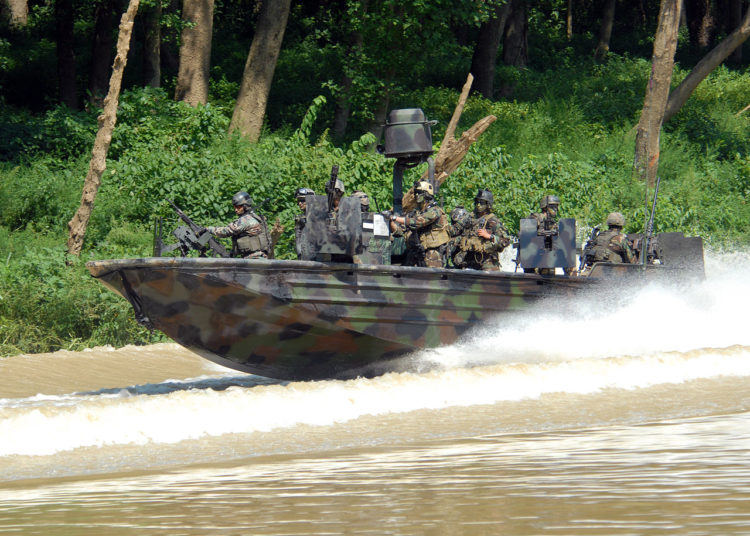The Trump administration announced earlier this week that the U.S. is moving newly-deployed naval ships toward the coast of Venezuela as it will be beefing up counter-narcotic operations in the Caribbean.
Not so coincidentally this new deployment follows an indictment of Venezuelan President Nicolás Maduro on narcoterrorist conspiracy charges, Maduro is accused of aiding in smuggling into the U.S. 250-metric tons of cocaine per year.
“As governments and nations focus on the coronavirus there is a growing threat that cartels, criminals, terrorists and other malign actors will try to exploit the situation for their own gain,” President Trump said. “We must not let that happen.”
The president was joined by Defense Secretary Mark Esper and Joint Chiefs of Staff Chairman Mark Milley, as he made the announcement at the start of his daily briefing on the coronavirus containment effort.
Jorge Rodriguez, Venezuela’s Communications Minister, called the deployment of U.S. Navy ships a “desperate attempt to distract attention from the tragic humanitarian crisis” (referring to the corona situation in the U.S.) He also claimed that for “the first time” in decades the United States is taking on the cocaine trade while, according to him, most of it comes from Colombia.
Defense Secretary Mark Esper speaking after the president’s announcement added that “corrupt actors, like the illegitimate Maduro regime in Venezuela, rely on the profits derived from the sale of narcotics to maintain their oppressive hold on power. The Venezuelan people continue to suffer tremendously due to Maduro’s criminal control over the country.”
This new mission involves sending additional Navy destroyers, and Air Force surveillance aircraft to nearly double the U.S. counternarcotics capacity in the Western Hemisphere. Forces will operate both in the Caribbean and eastern Pacific. Esper added that 22 partner nations would support the mission.
As much as this will be a counter-narcotics mission, it is just as much a show of force against the Maduro regime designed to ratchet up pressure on Maduro and his allies. Still, it is doubtful that the administration is planning any military action against Venezuela,
Despite that, President Trump has frequently stated that all options are on the table against Maduro, including removal by military force. But there are few in Washington or elsewhere that would support such a move. Yet, the President’s pronouncement may also be aimed at sending a signal to the military that there is little hope for this regime.
Maduro has stepped up his attacks on opposition leader Juan Guaidó. Maduro’s government called on Maduro to answer charges in court, but it is doubtful that he will answer the subpoena as this may be an attempt to arrest him. Guaidó is considered the rightful ruler of Venezuela by about 60 different countries.
All of this comes on the heels of an incident involving a Venezuelan patrol boat. The Venezuelan boat “Naiguata” was sent to intercept “Resolute” a Portuguese cruise ship sailing close to Venezuela’s coast but in international waters. Yet, the Maduro regime claimed that the Portuguese ship illegally entered Venezuela waters.
Already have an account? Sign In
Two ways to continue to read this article.
Subscribe
$1.99
every 4 weeks
- Unlimited access to all articles
- Support independent journalism
- Ad-free reading experience
Subscribe Now
Recurring Monthly. Cancel Anytime.
The Naiguata ordered the Resolute to follow it to Venezuela and port, on the pretext of “violation of Venezuelan territorial waters.” While the cruise ship’s crew consulted with their home office, the Naiguata began firing warning shots across the Resolute’s bow. The Naigata’s captain then made the foolish decision to ram the Naiguata repeatedly into the Resolute’s bow. The cruise ship was designed to sail in iceberg infested waters and the ramming did scant damage to her hull. But the Naiguata crippled herself and sank.
Maduro alleged that the cruise ship was actually to blame in an “act of aggression and piracy.” He added that the cruise ship was full of mercenaries bent on removing him from power. “You have to be very naive to see this as an isolated incident,” Maduro said Tuesday night in a televised statement.
The incident took place about 13 nautical miles off the coast of Isla de Tortuga, an uninhabited island.










COMMENTS